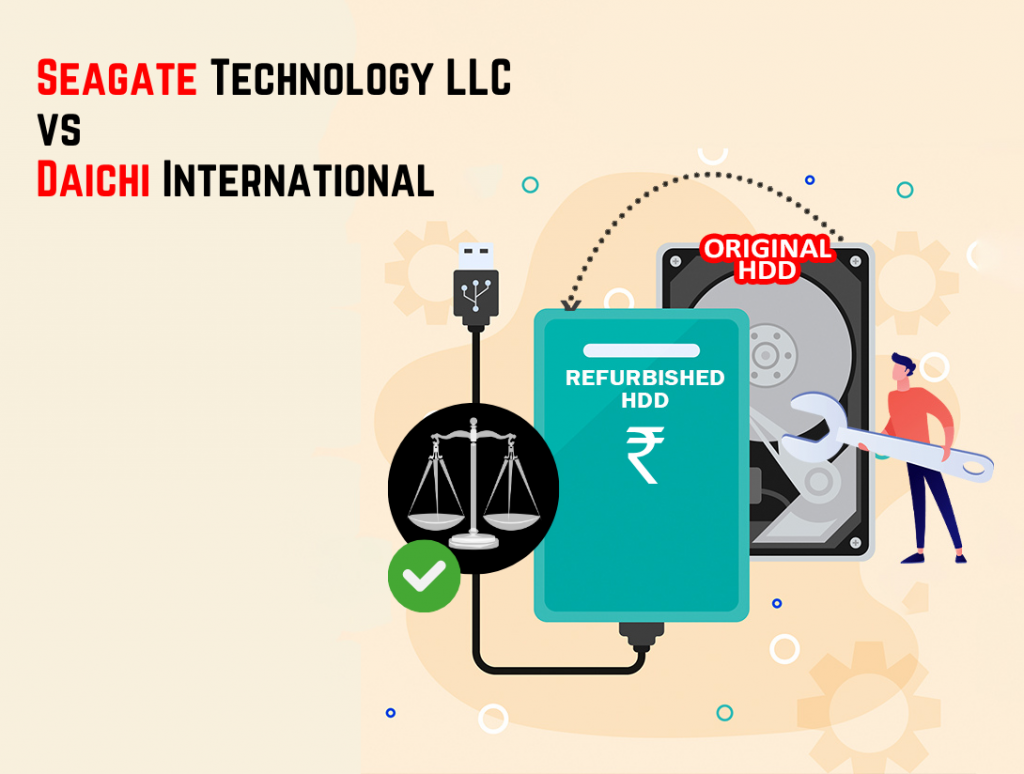SEAGATE TECHNOLOGY LLC V. DAICHI INTERNATIONAL

2024:DHC:4193
PUBLISHED AS ON 24.06.2024 BY MS. HARINDER NARVAN, MS. APARNA JAIN, AND MS. AASHRIKA AHUJA
INTRODUCTION
This judgement delivered on 21.05.2024 has been significant and instrumental in setting a precedent on how refurbished goods can be marketed without infringing on the trademark rights of the original manufacturers. The Delhi High Court’s interpretation of Section 30(3) and 30(4) of the Trade Marks Act 1999 serves as a guiding framework for similar disputes, ensuring that refurbishers respect the original trademarks while promoting the legal resale of end-of-life products. In this case, the plaintiff supplied Hard Disk drives (HDDs) to Original Equipment Manufacturer for usage in laptops and desktops. Used HDDs are imported by a number of Indian importers and subsequently sold to refurbishers. These refurbishers undertake a process where they remove the original “Seagate” or “Western Digital” brand names from the HDDs. After the removal of these trademarks, the refurbishers rebrand the HDDs under different names and provide an extended two-year guarantee along with them. These refurbished HDDs are no longer covered by the original manufacturer’s warranty and are thus categorized as end-of-life (EOL) products. These EOL products were initially supplied to Original Equipment Manufacturers (OEMs) for integration into laptops, desktop computers and various other electronic devices. The refurbishment process, while extending the useful life of these HDDs, involves significant alterations, particularly the removal of original brand names, which raises legal and trademark concerns. The absence of the original warranty and the introduction of an extended guarantee by the refurbishers highlight the transition of these HDDs from their initial OEM deployment to a secondary market. This case examines the legality and implications of these practices under trademark law, particularly focusing on the balance between facilitating the reuse of technological products and protecting the trademark rights of the original manufacturers.
LEGAL ISSUES INVOLVED
The main issue in this case centered on whether Daichi’s practice of selling refurbished HDDs after removing the original brand names constituted trademark infringement. The Court considered the important aspect whether the removal of the brand names and lack of attribution to the original manufacturers violated the exclusive rights granted to trademark holders under the relevant trademark laws, including protections against unauthorised use and misrepresentation.
FINDINGS & OBSERVATIONS OF COURT
The Court in in its judgement has revealed that once the HDDs were integrated into electronic equipment and sold with a composite warranty provided by the OEMs, the manufacturers no longer had control over the HDDs. The Court held that that the defendants sold the refurbished HDDs through formal, legitimate transactions, which included the issuance of GST invoices and thus defendants’ sales activities not being unlawful, with, the sale and use of refurbished HDDs by the defendants does not fall within the ambit of infringement being a legitimate use.
IMPLICATIONS OF THE RULING
This decision acknowledges the necessity for a robust secondary market, allowing for the reuse and recycling of electronic components, while also protecting the rights and reputations of trademark holders. It clarifies that as long as the refurbishers adhere to legitimate business practices and the original manufacturers have no ongoing control or warranty obligations over the refurbished products, such sales do not inherently constitute trademark infringement. The ruling clarifies that the removal of original brand names from refurbished products does not inherently constitute trademark infringement if the original manufacturer has no ongoing control or warranty obligation over the products post-integration. The onus now is on refurbisher to disclose that the changes in the good are made by the refurbisher and do not resemble the original good released by the manufacturer in terms of ‘warranty, serviceability, life, manuals and brochure.’ This ruling sets a precedent that mere removal of a brand name, coupled with proper commercial practices like issuing invoices and paying GST, does not on its own provide sufficient grounds for claiming trademark infringement.
GUIDELINES ISSUED BY DELHI HC ON SALE OF REFURBISHED HARD DISK DRIVES
- Name of Original Manufacturer: The Delhi HC directed that the packaging must clearly state the name of the original manufacturer in a way that does not mislead customers into believing they are purchasing a new product.
- No Manufacturer’s Warranty: HC said the packaging must include a clear statement indicating that there is no manufacturer’s warranty or service on the refurbished product. Instead, it should prominently display that any warranty or service is provided by the refurbishing entity. This statement must also include customer care details and contact information for the respective businesses that refurbish gadgets.
- Accurate Description of Features: HC stated that packaging must accurately and truthfully describe the features of the refurbished product. It should avoid any misleading, ambiguous, or deceptive statements that could misinform consumers about the product’s capabilities or intended use.
CONCLUSION
The changing and dynamic nature of trademarks law with every new judgement by the high courts from time to time is indeed adding constant growth to the world of consumers but ultimately when ethical practices and adherence to regulations in the electronics industry, benefit consumers and promote fair competition; that’s when the ground reality starts taking new shape. At Knowledgentia, we support our clients not only to devise effective brand strategy apprising them with legal implications, but also with respect to timely filings, registrations, proactive legal actions in infringement and piracy matters.

